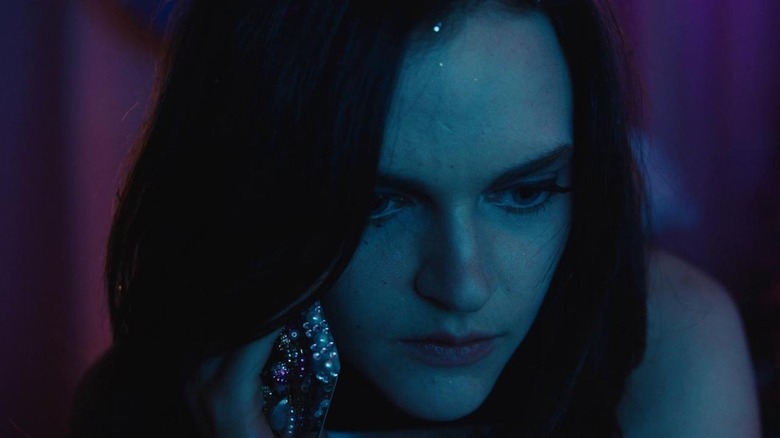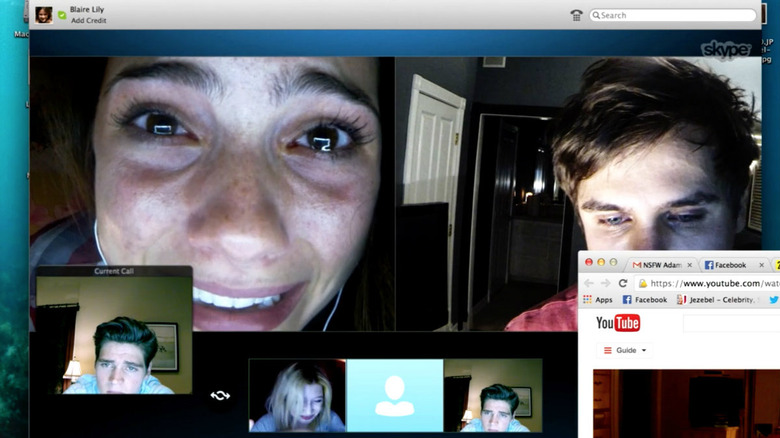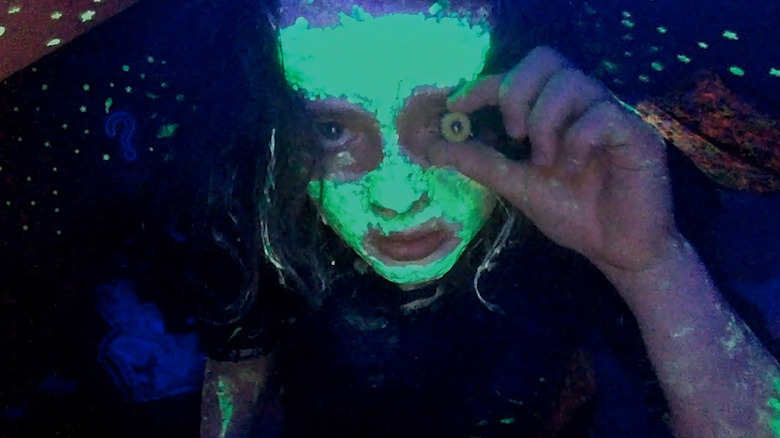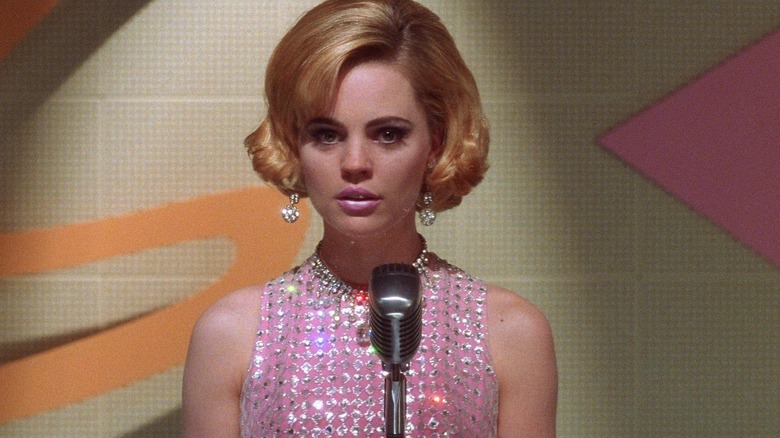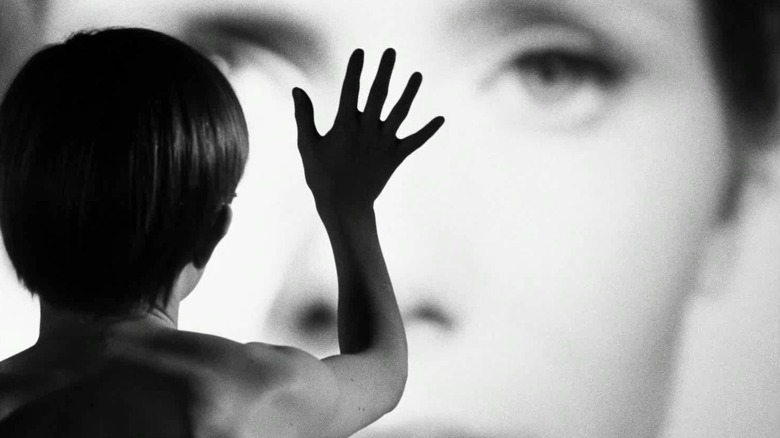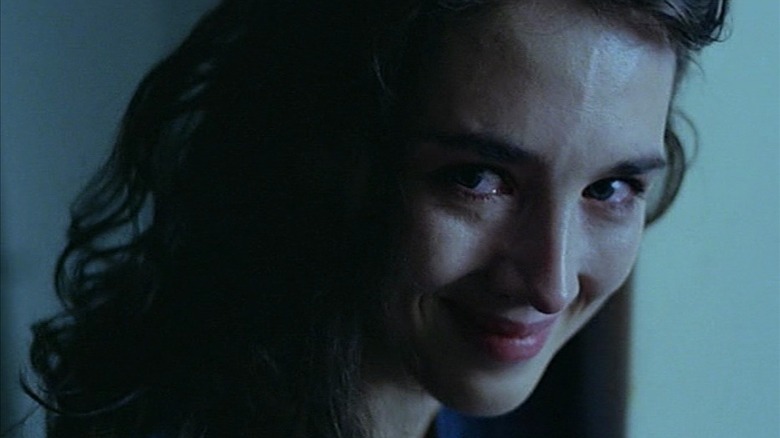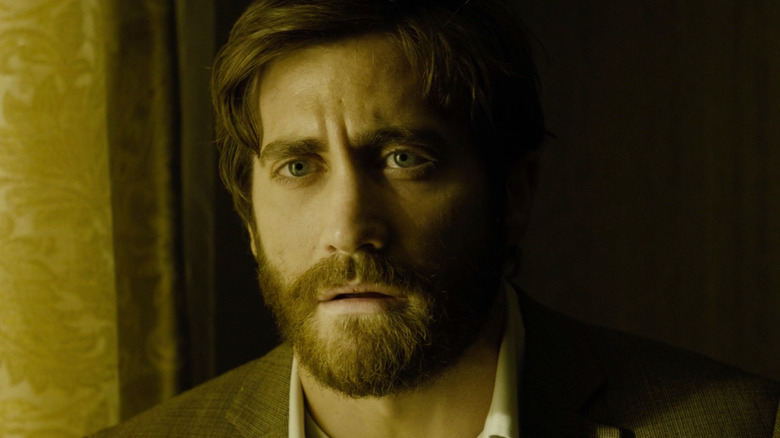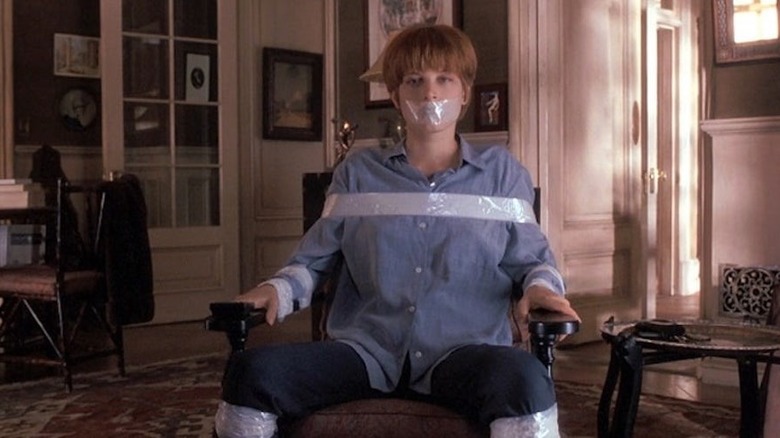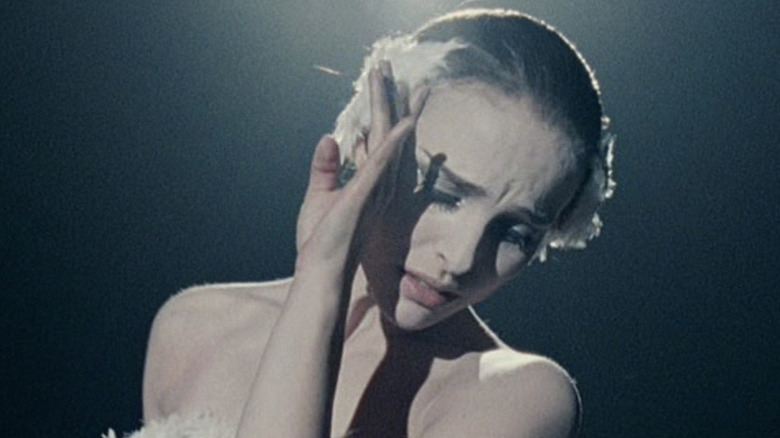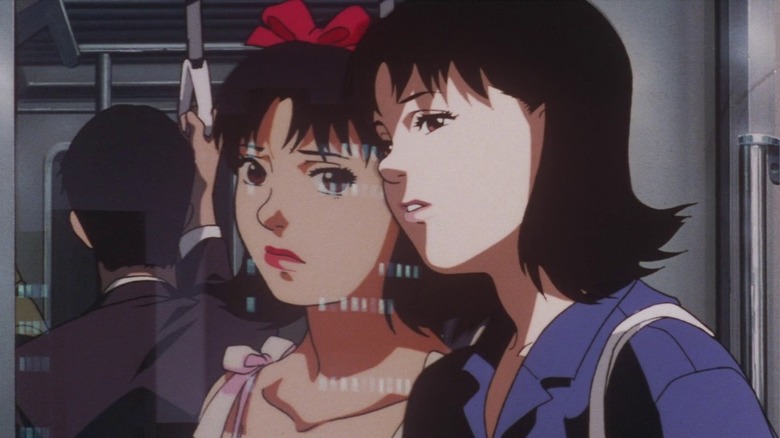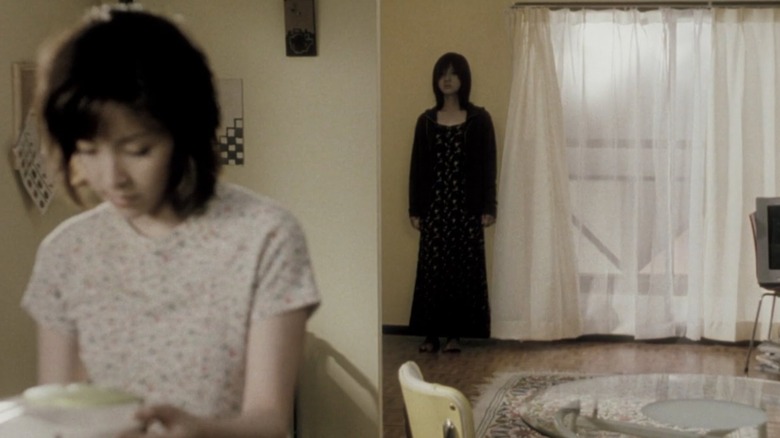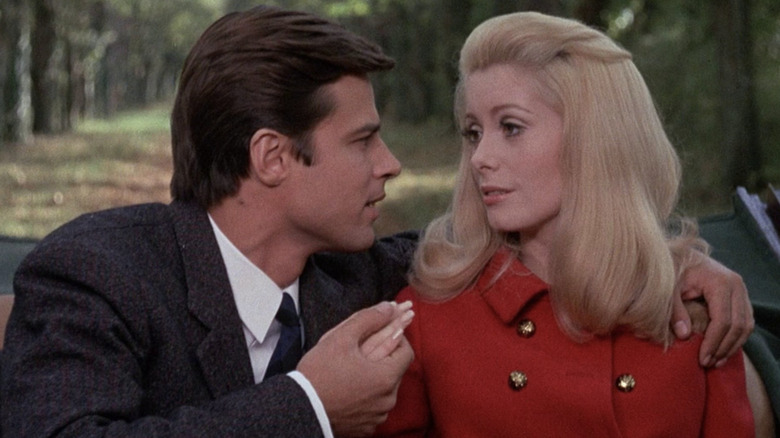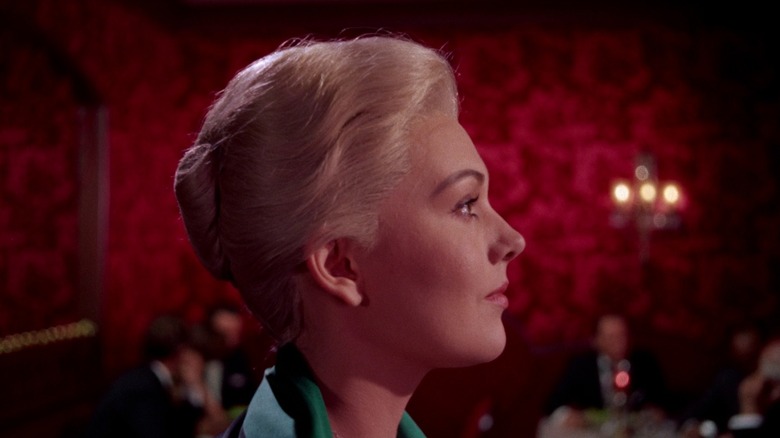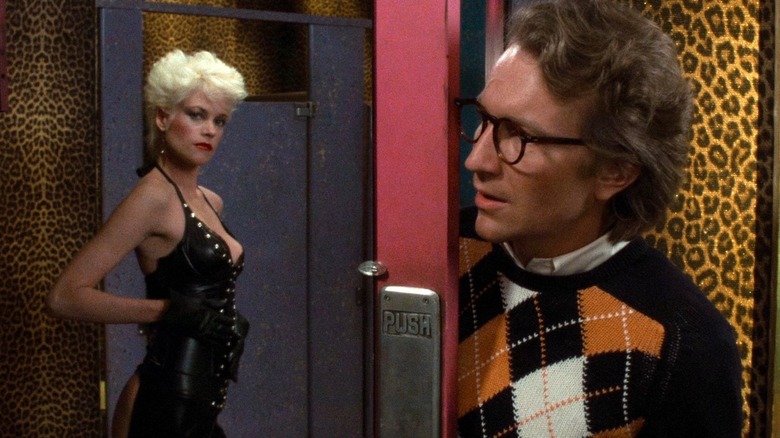13 Horror Movies Like Cam Every Mystery Lover Needs To See
It is difficult to stick "Cam" into one genre box. The feature film debut of director Daniel Goldhaber is part cyber-thriller, part identity horror film, and part suspenseful mystery; a terrifying mashup that bends and adapts to deliver on digital scares that are simultaneously all-too-real and nightmarishly impossible. "Cam" follows Alice (Madeline Brewer), a young woman who works as a cam-girl to pay the bills, performing live for her online audience and obsessing about the metrics that tie directly into her self-worth. Written and produced by former cam girl Isa Mazzei, "Cam" focuses on the pressure Alice feels to keep her everyday life and her erotic, increasingly violent, live streams separate. This division is promptly compromised when a woman, who looks exactly like Alice, appears online, stealing her fans, income, and most disturbingly ... her face. What's going on? Is it a technical error? Identity theft? A curse? Together Goldhaber and Mazzei deliver a nuanced and spine-tingling story about the way we fracture our "real world" selves from our online personas.
As with most films concerned with doppelgängers and doubles, "Cam" features not just one, but multiple top-shelf performances from Brewer, who does double duty as Alice and her nefarious and disturbingly inhuman cyber-self. Outside of Brewer's incredible performances, "Cam" absolutely holds its own within multiple genre spaces, from erotic thrillers to murder mysteries to out-and-out horror films. So, if you've seen "Cam" and want more recommendations of films that scratch a similar itch, keep reading! Below we've assembled 13 films from across the world and cinema history that will make for an unforgettable double bill.
Unfriended
At numerous points over the course of "Cam," our screen reflects the perspective Alice's a.k.a. Lola_Lola's viewers. From a chat feed to a climbing subscription count, all the user interface elements of FreeGirlsLive are quite literally on display. While these digital POV shots are fleeting, they have the effect of putting us in the position of a client. It's far more than a cheeky stylistic touch — it's a clever way of giving the uninitiated insight into the world of camgirls and of making viewers interrogate their own voyeuristic tendencies as a filmgoer.
In fact, there are a very small handful of films that are told entirely from the perspective of a digital screen, which is a genre known as "screenlife." One of the best examples of this is the under-appreciated "Unfriended," a 2014 horror film that follows through on the ostensible promise of "desktop horror."
The film follows a group of high school friends ,who get together on Skype for an evening hang-out sesh, only to be interrupted by an unknown user. Unable to shake the intruder, the teens begin to entertain the idea that the interloper is somehow connected to classmate Laura Barns, who took her own life after being cyberbullied. Visceral and affecting — even though some of the film's digital tech has since fallen by the wayside — "Unfriended" is arguably the best example of the kind of innovative storytelling screenlife is capable of achieving. Prospective viewers take note: "Unfriended" is best watched on a laptop, in bed, around 2 in the morning.
If you or anyone you know is having suicidal thoughts, please call the National Suicide Prevention Lifeline at 1-800-273-TALK (8255).
We're All Going to the World's Fair
Films about creepypastas — horror legends and myths created and disseminated on the internet — are few and far between. Or, maybe we should say good films about creepypastas are few and far between. Few feature-length films (yes, we're looking at you, 2018's "Slender Man") are able to capture the slow, steady dread that makes creepypastas different from traditional horror-tinged folklore. A good creepypasta makes you feel like you stumbled across a secret club: a different plane of reality, where high strangeness abounds and the line between reality and storytelling becomes trickier to identify.
2021's "We're All Going to the World's Fair" really feels like bumping up against a dark corner of the internet. The film follows a mentally shaky teen named Casey (Anna Cobb), who becomes involved in a dark online role-playing game. As Casey begins to exhibit stranger and stranger behavior in her video uploads, it's never clear if her waning sanity is all part of the game or a genuine effect of messing around with something supernatural. Then again, being an adolescent and chronically online while working through major questions and anxieties is dehumanizing and isolating enough — throw predatory adults and bizarre online games into the mix, and you've got a film that excels in crawling under your skin.
Mulholland Drive
While "Cam" certainly boasts more of a nightmarish quality than a dream-like one, its resonance with one of Hollywood's greatest dreamers is absolutely undeniable. David Lynch's "Mulholland Drive" shares a good deal of the same thematic interests as "Cam." Both films are keenly focused on the predatory nature of the entertainment industry, especially for women. Both movies revel in blurring the line between fantasy and reality: between the subconscious and the waking world, and the dangerous, often violent, points at which the two intersect. These are films about starry-eyed women looking to make it big, in their own way, who find themselves caught in a twisted trap hinging on murky identities, memory gaps, and the ever-present sense that something is undeniably "off" about reality, such as it is.
Released in 2001, "Mulholland Drive" follows the intertwined lives of two women: Rita (Laura Harring), the amnesic sole survivor of a fatal car crash, and Betty (Naomi Watts), a starry-eyed Hollywood hopeful. Perhaps as a consequence of the pair's fragile psyches, a cryptic conspiracy begins to emerge, as they dig deeper into Rita's mysterious past. Featuring Lynch's characteristically surreal storytelling and two incredible performances from its two female leads, "Mulholland Drive" is one of the greatest films about the uncanny, predatory nature of show business.
Persona
Simultaneously one of the most personal and confounding entries in the filmography of Swedish director Ingmar Bergman, 1966's "Persona" follows two women: a young nurse named Alma (Bibi Andersson) and Elizabet (Liv Ullman), a mute actress and Alma's charge. As the pair spend more and more time together secluded in a cottage on a remote island, the boundaries between their individual personalities begin to collapse. While Alma speaks to the silent Elizabet, revealing secrets and confessing intimate truths to her patient, she realizes that Elizabet's personality is beginning to engulf her own.
If you enjoyed "Cam" for its fractured personalities and doubles but you're in the mood for something a little more bloodless, Bergman's classic is absolutely the way to go. In "Persona," the self is far from permanent; it's mutable, slippery, and perhaps most disturbingly, transferable. Bergman teases anxiety and suspense out of the universal experience of having your existence witnessed by others. A haunting and disturbing examination of the fragility of the human psyche, Bergman effortlessly invites us to let easy answers and certainty dangle in the wind. Visually experimental and emphatically dream-like, "Persona" is an international classic that every film fan (and "Cam" fan) should bump to the top of their watchlist.
Possession
If you watched "Cam" and thought it had too much of a happy ending, allow us to point you in the direction of "Possession." Andrzej Żuławski's 1981 film may seem miles away from a modern thriller about the invasive identity horrors of online existence. But upon closer inspection, the two films have plenty of unnerving linkages in common.
Set in post-WWII Berlin, "Possession" follows a couple whose marriage has the structural integrity of a bowl of Jell-O. Mark (Sam Neill) can't figure out what caused his wife, Anna (Isabelle Adjani) to leave him and their young son. After a well-deserved, self-pitying mental breakdown, Mark decides the only logical, sane course of action is to stalk Anna to see if she's been sleeping with another man. What Mark ultimately discovers is far more unsettling than any passing tryst, as his surveillance of Anna leads him to a decrepit apartment home that contains a dark, fleshy, undulating secret.
Featuring (multiple) incredible performances from Adjani both as the tormented Anna and her mysterious look-alike Helen, "Possession" is emphatically concerned with the way we tear ourselves apart (and put ourselves back together) over the course of intense relationships. Certainly not for the faint of heart and boasting one of the bleakest endings in genre film history, "Possession" is a certified classic and inarguably one of the best doppelgänger horror films ever made.
Enemy
If you've been paying close attention, you may have noticed a trend in the films on this list, which tend to feature doppelgängers and sinister doubles. And it may not have escaped your notice that all of them are women. Well, in the interest of diversifying things a bit, let's chat about Denis Villeneuve's 2013 film "Enemy."
Adam Bell (Jake Gyllenhaal) is a history professor with a steady girlfriend and an almost agonizingly normal life. Then, one night, he makes a chilling discovery while watching a movie: One of the actors might as well be his identical twin. Progressively, after finally tracking his double down, the two men become progressively obsessed with one another ... and each other's personal lives. While Adam's psychological split is more about his inherent fear of a healthy relationship than it is about the pressures of being a camgirl, "Enemy" is still fundamentally concerned with some of the same terrifying questions as "Cam." Namely, a skin-crawling sense that reality may be folding over on itself, unhinging at the seams, and casting doubt on everything that previously seemed so clear-cut. While the specificities of the self-imposed expectations might vary across the two films, both Villeneuve's film and "Cam" agree that under pressure, we can be our own worst enemy.
Single White Female
While the flesh and blood existence of Alice's malicious alter ego in "Cam" is ultimately ambiguous, Allie Jones (Bridget Fonda) is dealing with a very real, and very dangerous doppelgänger dilemma. "Single White Female" follows Allie, a successful software designer living in the Big Apple, whose personal life begins to fall apart after she learns that her fiancé, Sam (Steven Weber), has been unfaithful. Understandably desperate to hold on to her rent-controlled Manhattan apartment, Allie places an ad in the paper for a roommate. She decides to go with Hedy (Jennifer Jason Leigh), who seems like a perfect candidate. Almost too perfect of a candidate, now that we think about it. As the two become fast friends, the red flags start coming out of the woodwork, with Hedy taking steps to copy Allie's appearance, until you'd be forgiven for mistaking the pair as twins.
Directed by Iranian filmmaker Barbet Schroeder, "Single White Female" easily emerges as one of the better — or at least, consistently entertaining — entries in the erotic thriller boom that took the 1990s by storm. An identity thriller that delivers some serious, gut-sinking chills (dog lovers beware), "Single White Female" still delivers enough unintended camp to resonate with the more fantastical elements of "Cam."
Black Swan
Darren Aronofsky's 2010 "Black Swan" draws directly from another film on this list — Satoshi Kon's "Perfect Blue" — to explore fractured identities and the pressures of fame. A reserved ballerina named Nina (Natalie Portman) is cast in the lead role in her dance company's production of "Swan Lake." While naive, poised Nina has no problem with inhabiting the role of the demure White Swan, when it comes to dancing the part of the seductive, bold, Black Swan, Nina comes up short. Not used to anything less than perfection and facing immense pressure from all sides — including (or especially from) from herself — Nina's grip on reality begins to slip. Soon, the prima ballerina finds herself mutilating not only her body, but her mind, as she becomes increasingly jealous of her understudy, the self-assured and seductive Lily (Mila Kunis).
While clamoring after a follower count and live stream views may seem incomparable to a big-league ballet performance, maddening perfectionism and self-criticism is the name of the game in both camps. And as "Cam" is keen to note, the more tenuous links between reality and performance only become hazier and more difficult to parse in a digital space. With the explicit duality of Nina's role in "Swan Lake," and her own fracturing personality, there are also plenty of doppelgänger delights to tie these two films together.
Perfect Blue
At the behest of her manager, teen pop idol Mima Kirigoe (voiced by Junko Iwao) retires from her pastel-colored J-Pop girl group to become an actress and soap opera star. While Mima navigates an industry keen to sexualize and objectify her, her departure from her girl group incurs the wrath of one of her former fans. Things begin to escalate when violent and disturbingly intimate blog posts featuring Mima's personal information begin appearing on her website, posts she claims that she didn't upload herself. Then when those in her entourage, who encouraged the career change, begin showing up dead, Mima begins to suspect that a doppelgänger wearing her face is to blame. Mima's state of mind increasingly unravels (understandably so!), as her formerly bubblegum-colored world comes crumbling down around her.
Directed by the great Japanese animator Satoshi Kon (who also helmed the equally excellent, and surreal "Millennium Actress" and "Paprika"), 1997's "Perfect Blue" is a disorienting and skin-crawling watch that was truly ahead of its time. Peeling back the invasive horrors of the internet's impact on self-image, fan culture, and the ways in which the entertainment industry simultaneously shames and objectifies women, "Cam" and "Perfect Blue" make for one heck of a ... perfect double bill.
Pulse
While "Cam" is certainly up there in the list of spine-tingling horror films about the hazy nastiness of online existence, few internet terror trips can compete with "Pulse." Unleashed on the world in 2001, Kiyoshi Kurosawa's unbearably depressing film melds ghost stories with the uncanny identity crisis instigated by online life. Serving as a slow-burning, stern reminder that internet users are all-too-willing to surrender themselves to a hive mind very few people fully understand, "Pulse" (or "Kairo" as it is known in its native Japan), follows a group of characters across Tokyo, who cross paths following the discovery that strange traces of dead and disappeared people linger in their computers.
While many other web-centric horror films hinge on the argument that what we do and post on the internet will haunt us forever, "Pulse" has a far more horrifying proposal: Nothing we do, online or otherwise, is permanent. Our digital ghosts will fade into the ether, forgotten and alone. An essential watch for anyone interested in the history of internet horror, "Pulse" will reward the patient viewer with an atmospheric and patently soul-crushing watch that may have you side-eyeing your laptop and questioning whether any of your digital relationships are really as real as you think.
Belle de Jour
The digital mechanics and parasocial relationships of "Cam" may strike viewers as undeniably modern. And while its true that "Cam" has some uniquely internet-centric things to say about the specific highs and lows of sex work in the internet age, many of its broader strokes carry the genetic material of far older cinematic fare. Take for instance, "Belle de Jour," the 1967 French-language thriller about a Parisian housewife, who begins to secretly spend her afternoons as the prize attraction in a downtown bordello. Big-eyed and blonde, Catherine Deneuve stars as Séverine whose public life at country clubs and on her well-respected husband's arm clash directly with her violent fantasies: BDSM visions of humiliation, filth, and restraints that blur the line between pain and pleasure.
Directed by the great Spanish surrealist Luis Buñuel (who readers may know for his shocking first feature, "Un Chien Andalou"), "Belle de Jour" shares a number of striking similarities with "Cam." Both films forefront the potential for violence in both sex work and fractured psyches, while refusing to pass firm, moralistic judgment on sex work as a whole. They are specific stories about specific women, and never feel puritanical or condescending towards their subjects. Both films also feature heroines for whom fantasy and reality become one and the same, with what's real and imagined becoming harder and harder to tease apart. While "Belle de Jour" may be one of the older films on this list, it is no less relevant or transgressive than any of its modern peers.
Vertigo
Retired San Francisco police detective Scottie Ferguson (James Stewart) is pulled out of the doldrums of early retirement when an old college pal asks Scottie to investigate his wife, Madeleine (Kim Novak). Lately, for no discernible reason, Madeline has become distant and icy. Scottie's pal worries that Madeleine's mental health might not be doing so hot, as she has come to believe that she was possessed by the spirit of an ancestor, who committed suicide. As Scottie follows Madeleine's every move, the retired detective becomes obsessed with the mystery surrounding her. Things only get more complicated and predatory when Scottie becomes involved with a woman named Judy, who may as well be Madeline's twin.
Doubles and dangerously obsessive peeping toms? Need we say more about the links between Alfred Hitchcock's masterpiece and "Cam"? Released in 1958, "Vertigo" may be the oldest film on this list, but don't let that scare you away. Hitchcock's unflappable talent for blending stylized elements into gripping thriller narratives is on full display: dreamy colored gels, dolly zooms, and expressionistic geometry that emphasizes the disorientation innate in the film's approach to psychological horror. Visually striking and chillingly flirty with their supernatural elements, "Cam" and "Vertigo" are perfectly compatible bedfellows.
Body Double
Most of the films on this list could conceivably be called "Body Double," what with all the duplicitous doppelgängers knocking around. But director Brian de Palma is, in the end, inimitable ... an ironic fact considering much of the auteur's career has been spent writing cinematic love letters or veiled criticisms to the likes of Dario Argento and Alfred Hitchcock. While we've been here before with the likes of "Peeping Tom," "Rear Window," and "Deep Red" — films that offer a spicy confluence of voyeurism, murder, and mystery — de Palma's take is (mostly) all his own.
Released in 1984 (this film is arguably the most 1980s film ever made), "Body Double" follows Jake Scully (Craig Wasson), an aspiring actor and claustrophobia sufferer. After Jake accidentally walks in on his wife cheating on him, he manages to peel himself off the barstool and go on the search for a place to crash. Luckily, a chance encounter with a friend of a friend lands Jake with one heck of a housesitting gig: in a massive, panopticon-like apartment overlooking the Hollywood Hills. Oh, and apparently the apartment comes with a unique perk: a drop-dead gorgeous neighbor with ... exhibitionistic tendencies. Soon, Jake finds himself embroiled in a dangerous domestic game, as he begins to suspect his neighbor's life might be in danger.
While "Body Double" may not feature any webcams or livestreams, the film is emphatically concerned with the performative aspect of sex work and the Hollywood machine writ large. To learn more about how the "double" bodies figure into all this, you'll just have to take a peep at this perverted, bananas gem.
